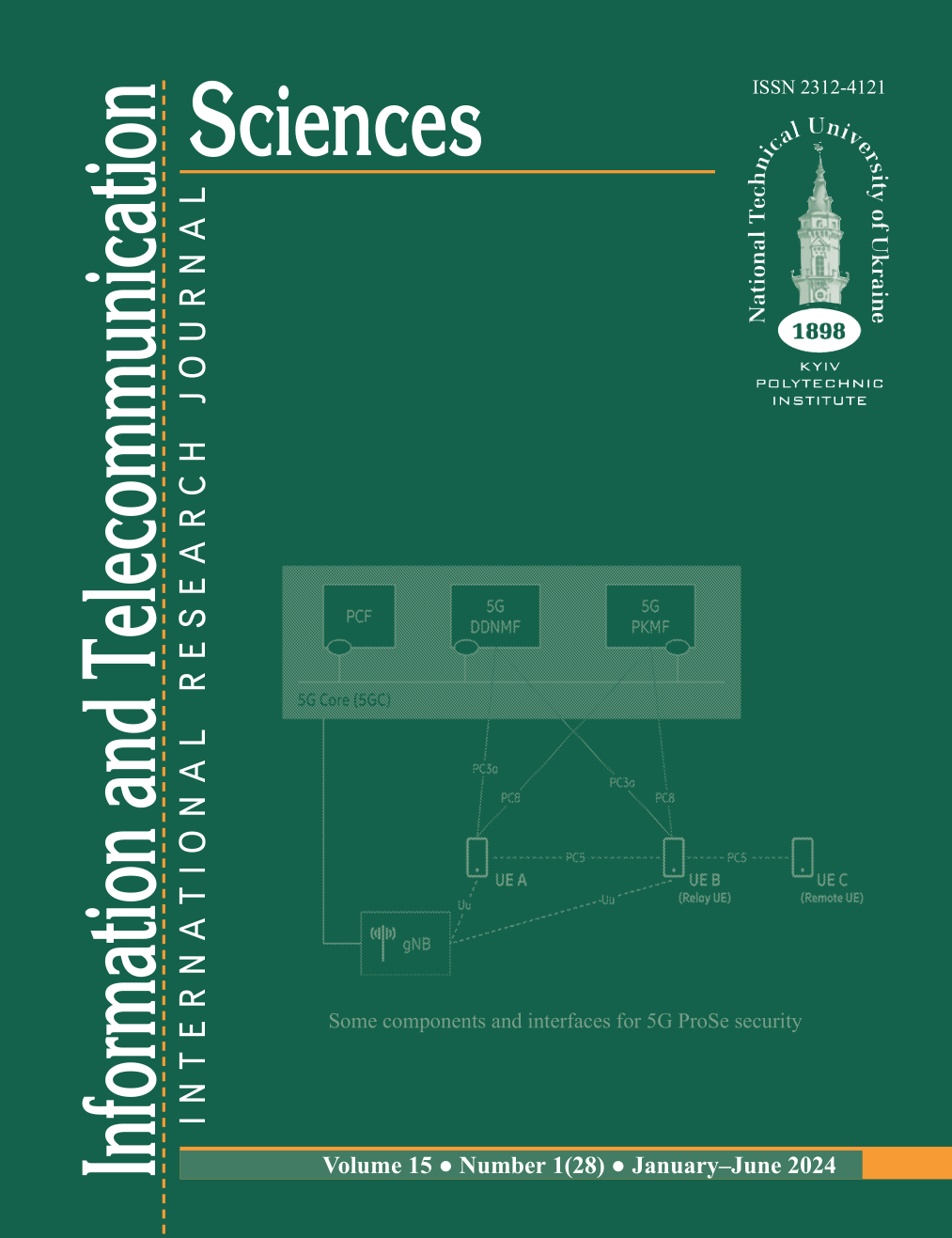ANALYSIS OF ROUTING PROTOCOLS CHARACTERISTICS IN AD-HOC NETWORK
DOI:
https://doi.org/10.20535/2411-2976.12024.12-17Keywords:
ad-hoc network, routing protocol, 5G, AODV, DSDV, GPSR, user mobility, network topology, data loss, network simulationAbstract
Background. Wireless ad-hoc networks are becoming increasingly prevalence in remote areas, in extreme environments, even in military operations, and in scenarios where setting up infrastructure networks is not possible. Research of ad-hoc routing protocols problems allows improving the efficiency of their operation in conditions of high variability in packet loss or instability of network operation when the speed of users changes.
Objective. The purpose of the paper is analysis of packet loss dependency from a network operation time, study of a user speed influence on a network efficiency, and research of network operation efficiency with different routing protocols.
Methods. The method of routing protocols efficiency evaluation is the simulation of their operation in an ad-hoc network on a test data set and research of a network indicators dependency in time under different loads and changing mobility of users.
Results. The conducted research demonstrated that user’s mobility at different speeds significantly affects the network operation as a whole. The instability of users' positions leads to a significant increase in route search time and packet transmission time. Among researched GPSR, DSDV, and AODV protocols, the latter proved to be the best because it has the lowest percentage of data loss and the lowest average time of message send and receive operations.
Conclusions. The work is dedicated to the actual problem of developing and setting parameters of ad-hoc network. Received research results indicate the need to choose the optimal routing protocol depending on specific application conditions, such as user movement speed and network stability. The proposed solutions can be the first stage of complex processing of packets in the mobile network and justify the choice of AODV protocol as a basis for further improvement.
References
Sharma, D., & Bhushan, B. (2019). AODV Functioning Procedure. International Journal of Management, IT & Engineering, 9(3), 2249-0558.
Liu, S., Yang, Y., & Wang, W. (2013). Research of AODV Routing Protocol for Ad Hoc Networks. ASRI Procedia, 5, 21-31. doi: 10.1016/j.aasri.2013.10.054.
Lafta, H. A., & Abbas, B. J. (2013). New Protocol To Save Power In Ad-Hoc Networks. Journal of Babylon University/Pure and Applied Sciences, 21(4), 2011.
Ergawy, A. (2007). Routing Protocols Wireless for Ad Hoc Wireless Networks: Classifications of Protocols and A review of Table Driven Protocols.
Abdelkader, B., Korichi, A., Bourouis, A., & Al-Jobouri, L. (2019). An Enhanced GPSR Protocol for Vehicular Ad hoc Networks. 2019 11th Computer Science and Electronic Engineering (CEEC). doi: 10.1109/CEEC47804.2019.8974321.
Gobindgarh, M. N. Hoda, Umang Singh, Milind, Parul Choudhary. "Simulation of AODV, DSR and DSDV Routing Protocols for Mobile Ad-hoc Networks." Proceedings of the 2nd National Conference on “Challenges and opportunities in IT”, RIMT-Institute of Engineering and Technology, Mandi Gobindgarh, March 29, 2008.
Pradeep Kumar T S. "Real-Time Traffic Simulation of Vehicular Ad hoc Networks." Chapter in "VIT University Chennai", September 2022.
Pestin, Maxim S., Novikov, Alexander S. "Simulation model of wireless ad-hoc network to study algorithms of traffic routing." Journal of Applied Informatics, August 2022, Vol. 17, Issue 4, pp. 75-86. DOI: 10.37791/2687-0649-2022-17-4-75-86.
Augustine Chidiebere Onuora, Chiemezuo Njoku Festus O Ogbunude, Osu Moses. "A Comparative Study of Simulation Tools for Ad hoc Networks." Proceedings of the Conference on Evaluating the Policies and funding for engineering sustenance: A panacea for functional Engineering product for economic emancipation, AIFPU, Ebonyi State, Nigeria, June 2021.
Y.Kim,J.Jung,S.Lee,C.Kim,A Belt-Zone Method for Decreasing Control Messages in Ad Hoc Netowkrs.ICCSA.2006:42-46.
Ankit Sggarwal, Bhumika Garg. Survey on secure AODV for Ad Hoc networks routing mechanism. J International Journal of Advanced Research in Computer Science and Software Engineering, 2012;2(3):203-206.
C.M barushimana, A.Shahrabi, “Comparative Study of Reactive and Proactive Routing Protocols тPerformance in Mobile Ad Hoc Networks,” Workshop on Advance Information Networking and Application, Vol. 2, pp. 679-684, May, 2003.
M.Abolhasan, T.Wysocki, E.Dutkiewicz, “ A Review of Routing Protocols for Mobile Ad Hoc Networks,” Telecommunication and Information Research Institute University of Wollongong, Australia, June, 2003.
K. Sanzgiri, D. LaFlamme, B. Dahill, B. N. Levine, C. Shields, and E. M. B. Royer, “Authenticated routing for ad hoc networks,” IEEE Journal on Selected Areas in Communication, vol. 23, no. 3, pp. 598-610, 2008.
Downloads
Published
How to Cite
Issue
Section
License
Copyright (c) 2024 Iryna Hryschuk, Andrii Astrakhantsev, Stanislav Pedan, Larysa Globa

This work is licensed under a Creative Commons Attribution 4.0 International License.
The ownership of copyright remains with the Authors.
Authors may use their own material in other publications provided that the Journal is acknowledged as the original place of publication and National Technical University of Ukraine “Igor Sikorsky Kyiv Polytechnic Institute” as the Publisher.
ITS articles are published under Creative Commons licence:
- Authors retain copyright and grant the journal right of first publication with the work simultaneously licensed under CC BY 4.0that allows others to share the work with an acknowledgement of the work's authorship and initial publication in this journal.
- Authors are able to enter into separate, additional contractual arrangements for the non-exclusive distribution of the journal's published version of the work (e.g., post it to an institutional repository or publish it in a book), with an acknowledgement of its initial publication in this journal.
- Authors are permitted and encouraged to post their work online (e.g., in institutional repositories or on their website) prior to and during the submission process, as it can lead to productive exchanges, as well as earlier and greater citation of published work.

